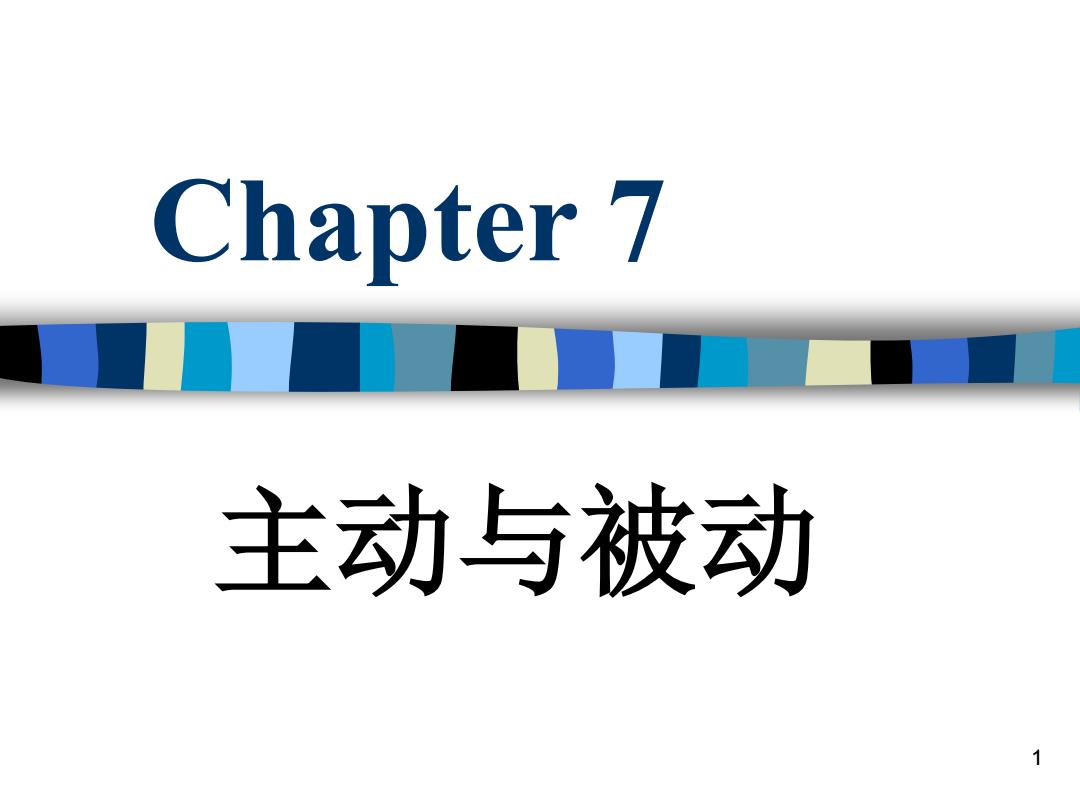
Chapter 7 主动与被动 1
1 Chapter 7 主动与被动
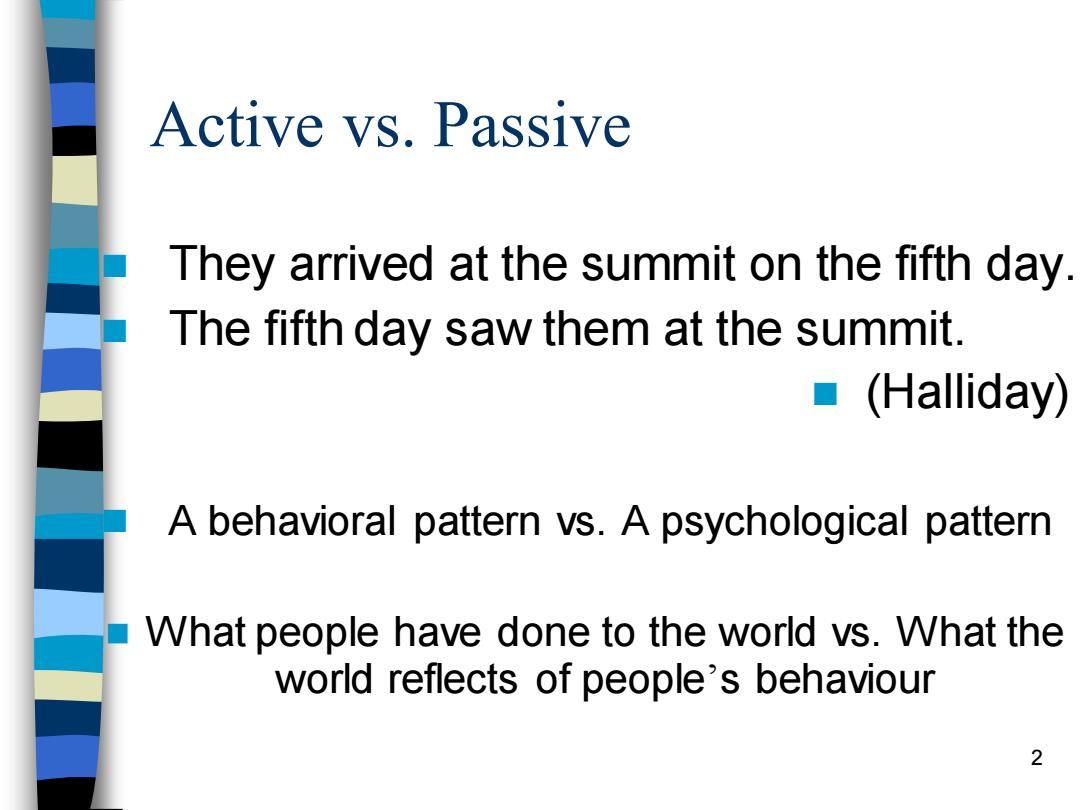
Active vs.Passive They arrived at the summit on the fifth day The fifth day saw them at the summit. (Halliday) A behavioral pattern vs.A psychological pattern What people have done to the world vs.What the world reflects of people's behaviour 2
2 Active vs. Passive ◼ They arrived at the summit on the fifth day. ◼ The fifth day saw them at the summit. ◼ (Halliday) ◼ A behavioral pattern vs. A psychological pattern ◼ What people have done to the world vs. What the world reflects of people’s behaviour
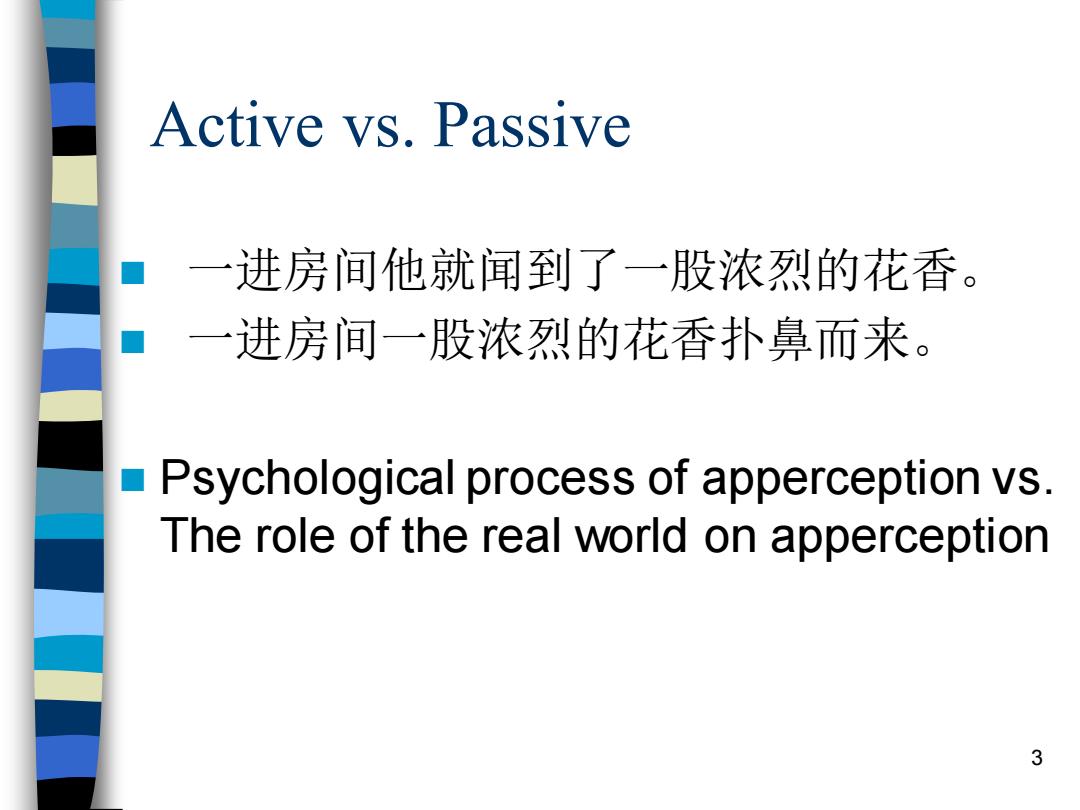
Active vs.Passive 一进房间他就闻到了一股浓烈的花香 一进房间一股浓烈的花香扑鼻而来。 a Psychological process of apperception vs The role of the real world on apperception 3
3 Active vs. Passive ◼ 一进房间他就闻到了一股浓烈的花香。 ◼ 一进房间一股浓烈的花香扑鼻而来。 ◼ Psychological process of apperception vs. The role of the real world on apperception
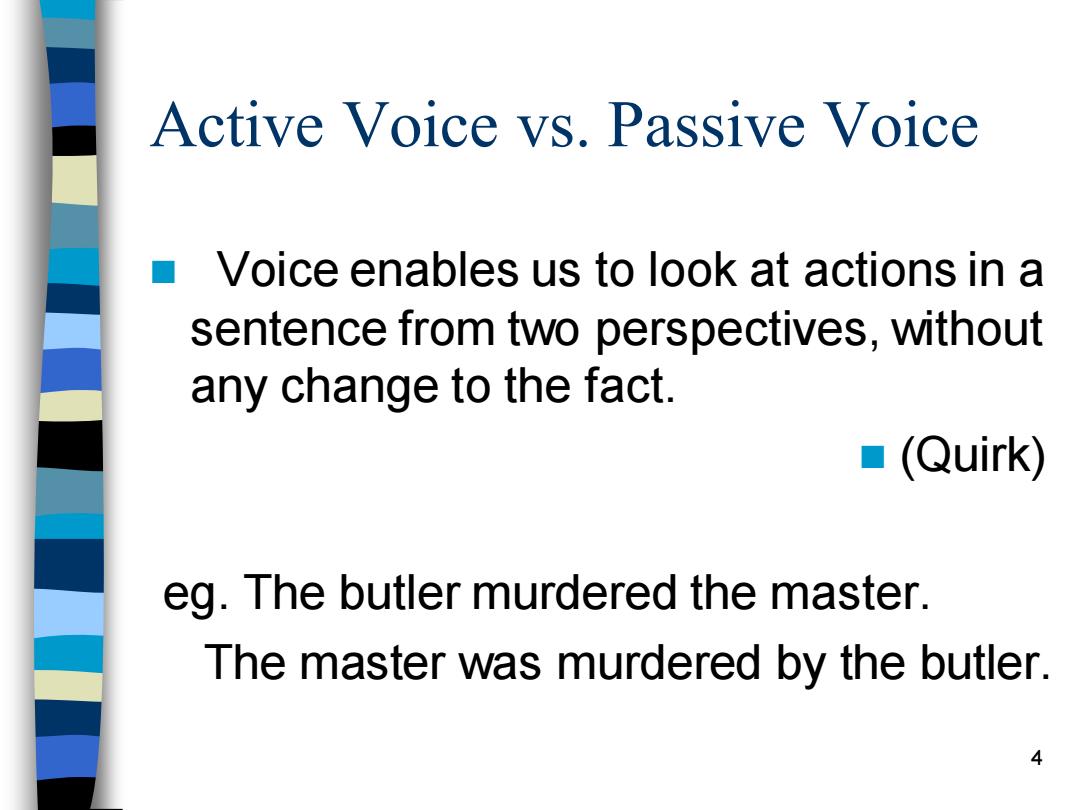
Active Voice vs.Passive Voice Voice enables us to look at actions in a sentence from two perspectives,without any change to the fact. ■(Quirk) eg.The butler murdered the master. The master was murdered by the butler. 4
4 Active Voice vs. Passive Voice ◼ Voice enables us to look at actions in a sentence from two perspectives, without any change to the fact. ◼ (Quirk) eg. The butler murdered the master. The master was murdered by the butler

Active Voice vs.Passive Voice Passive the opposite of Active ■(J.Vendryes) .Active voice emphasizes the action itself. Passive voice emphasizes the condition after the action is taken. 5
5 Active Voice vs. Passive Voice ◼ Passive ≠ the opposite of Active ◼ (J. Vendryes) ∴ Active voice emphasizes the action itself. Passive voice emphasizes the condition after the action is taken
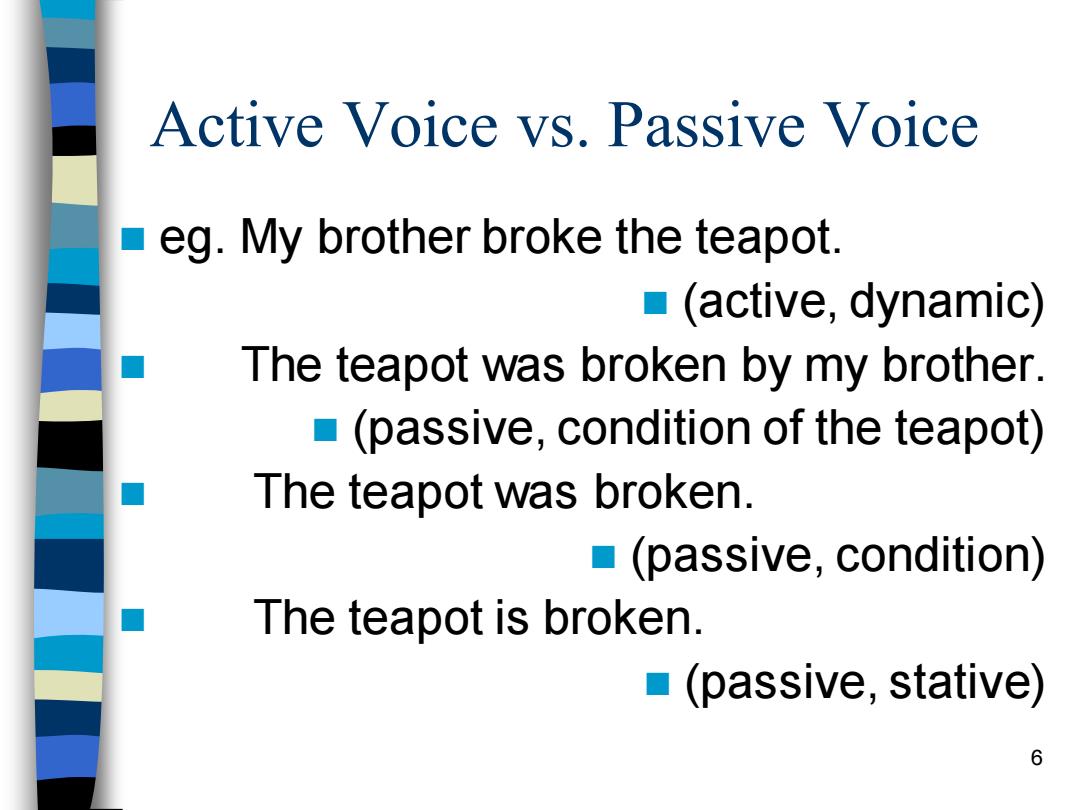
Active Voice vs.Passive Voice eg.My brother broke the teapot. ■(active,dynamic) The teapot was broken by my brother. (passive,condition of the teapot) The teapot was broken. (passive,condition) The teapot is broken. ■(passive,stative) 6
6 Active Voice vs. Passive Voice ◼ eg. My brother broke the teapot. ◼ (active, dynamic) ◼ The teapot was broken by my brother. ◼ (passive, condition of the teapot) ◼ The teapot was broken. ◼ (passive, condition) ◼ The teapot is broken. ◼ (passive, stative)
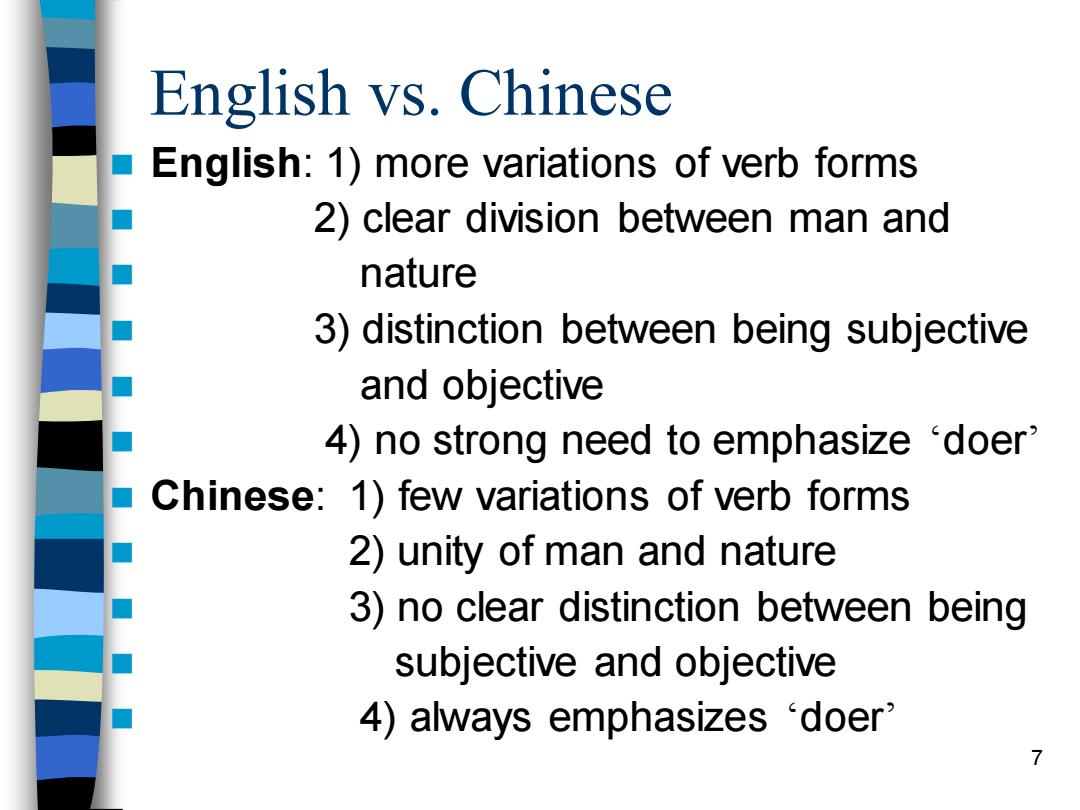
English vs.Chinese English:1)more variations of verb forms 2)clear division between man and nature 3)distinction between being subjective and objective 4)no strong need to emphasize 'doer Chinese:1)few variations of verb forms 2)unity of man and nature 3)no clear distinction between being subjective and objective 4)always emphasizes doer' 7
7 English vs. Chinese ◼ English: 1) more variations of verb forms ◼ 2) clear division between man and ◼ nature ◼ 3) distinction between being subjective ◼ and objective ◼ 4) no strong need to emphasize ‘doer’ ◼ Chinese: 1) few variations of verb forms ◼ 2) unity of man and nature ◼ 3) no clear distinction between being ◼ subjective and objective ◼ 4) always emphasizes ‘doer’
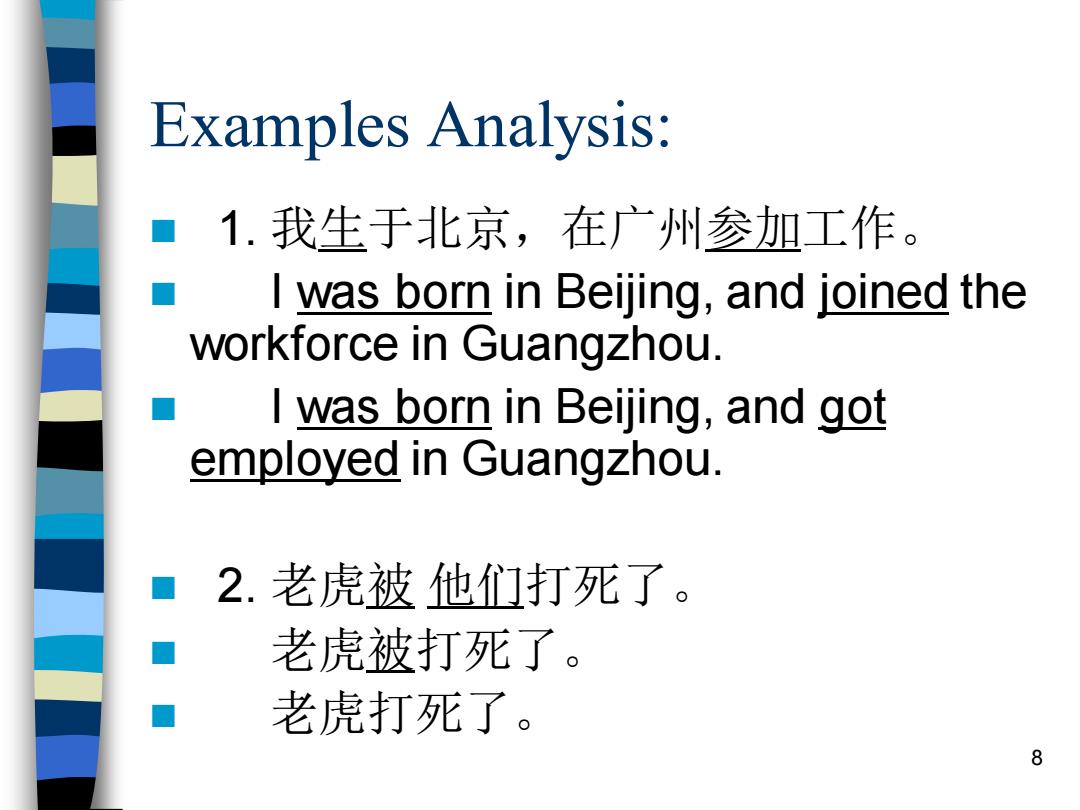
Examples Analysis: ■ 1.我生于北京,在广州参加工作。 I was born in Beijing,and joined the workforce in Guangzhou. I was born in Beijing,and got employed in Guangzhou. 2.老虎被他们打死了。 老虎被打死了。 老虎打死了。 8
8 Examples Analysis: ◼ 1. 我生于北京,在广州参加工作。 ◼ I was born in Beijing, and joined the workforce in Guangzhou. ◼ I was born in Beijing, and got employed in Guangzhou. ◼ 2. 老虎被 他们打死了。 ◼ 老虎被打死了。 ◼ 老虎打死了

Passive Voice:A Closer Look 1.Syntactic Passive: passive voice in the form and structure as being 'passive ■2.Notional Passive passive voice not in the form and structure as being passive',but offering a passive notion ■(Jesperson) 9
9 Passive Voice: A Closer Look ◼ 1. Syntactic Passive: ◼ passive voice in the form and structure as being ‘passive’ ◼ 2. Notional Passive ◼ passive voice not in the form and structure as being ‘passive’, but offering a passive notion ◼ (Jesperson)
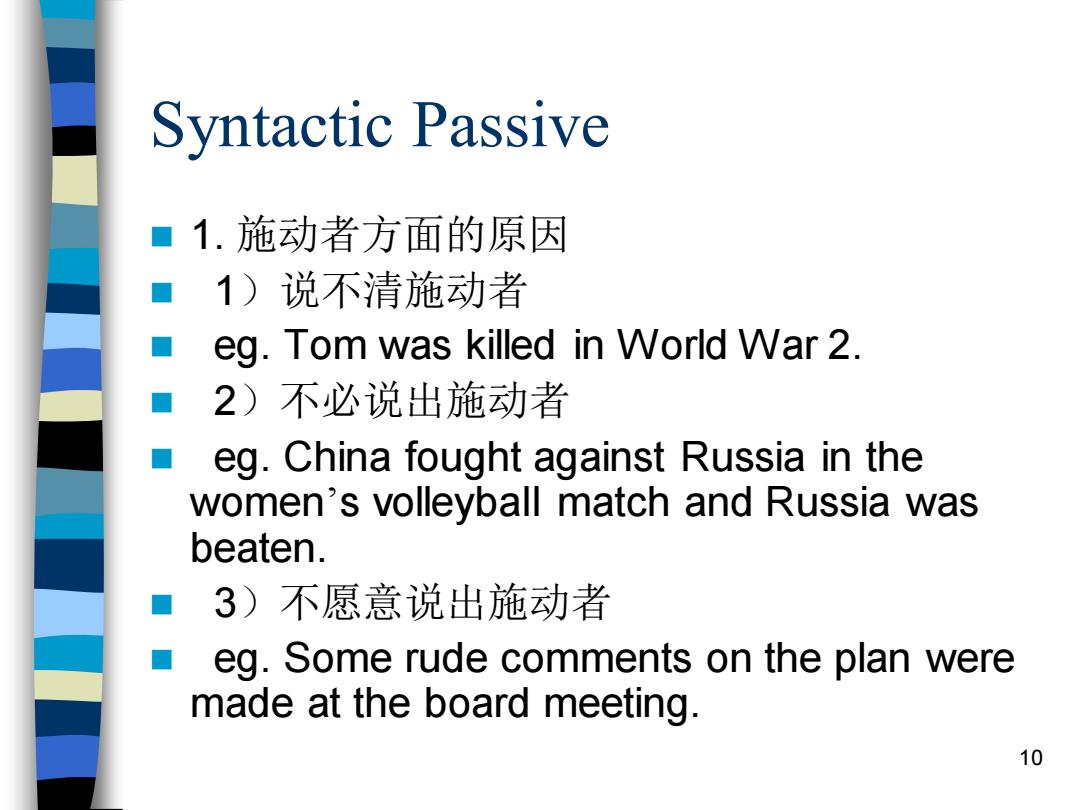
Syntactic Passive ■1.施动者方面的原因 1)说不清施动者 eg.Tom was killed in World War 2 2)不必说出施动者 eg.China fought against Russia in the women's volleyball match and Russia was beaten. 3)不愿意说出施动者 eg.Some rude comments on the plan were made at the board meeting. 10
10 Syntactic Passive ◼ 1. 施动者方面的原因 ◼ 1)说不清施动者 ◼ eg. Tom was killed in World War 2. ◼ 2)不必说出施动者 ◼ eg. China fought against Russia in the women’s volleyball match and Russia was beaten. ◼ 3)不愿意说出施动者 ◼ eg. Some rude comments on the plan were made at the board meeting